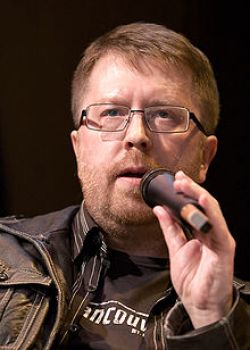Andrei Gelasimov

Born: 1966
Quick Study: Andrei Gelasimov debuted as a writer in 2001 with the story collection Fox Mulder Looks Like a Pig, beginning a career of writing short stories, novellas, and novels that have proven popular with readers and prize juries.
The Gelasimov File: Andrei Gelasimov was first published in the 1990s, as the Russian translator of Robin Cook’s Sphinx. He broke onto the literary scene in 2002 with his widely-praised story “The Tender Age,” came out in the journal Oktyabr after being published online. His works have since been translated into over a dozen languages. Since 2010, five Russian feature films or miniseries have been based on his fiction, including one, the 2013 film Thirst, which won multiple prizes and was hailed by critics as one of the best Russian films of the year. Gelasimov has always written about varied topics, and his last two novels of the 2010s, Windrose and Innocent Intoxication (a.k.a. Daddy Wassup) continued breaking new ground, with Windrose set in the Russian Far East of the nineteenth century and Innocent Intoxication involving, among other topics, rap, drugs, and immortality. Gelasimov landed the coveted role of writing the "Total Dictation" text for 2020.
Psssst………: Gelasimov translated Christopher Buckley’s Florence of Arabia, which was published in the Russian journal Foreign Literature in 2006… In 2005, Gelasimov was named the most-read Russian writer in France after the French translation of Thirst became a bestseller… He wrote The Ring of the White Wolf for his three children back in Russia while he was abroad in England, sending the chapters home one at a time by mail.
Gelasimov’s Places: Irkutsk: Born. Yakutsk: Studied and taught at Yakutsk State University. Moscow: Studied at both the Russian Institute of Theater Arts and the Moscow State Pedagogical University (where he defended his dissertation on “Oriental Motifs in the Works of Oscar Wilde”). England: lived there briefly.
The Word on Gelasimov: Mikhail Vizel’, a jury member for the National Bestseller Award, called Gelasimov’s The Gods of the Steppe, which went on to win the award, a “high-quality classical novel based on material familiar to the author (apparently the ‘Cossack line of the Gelasimovs’ mentioned in the book isn’t just a philological joke) with defined, vivid characters, clear plot lines, undercurrents that aren’t initially obvious, and love and hate.”
Gelasimov on Gelasimov: In a 2009 interview, after winning the National Bestseller Award, when asked if a writer can earn enough to support a family by just writing, Gelasimov said he can, “I’m very happy to loaf and write for about two hours a day. Of course I do very deep research. For The Gods of the Steppe, for example, the research took more time and energy than writing the text.”
On Writing: In a 2009 online Q&A session, Gelasimov answered a question about the status of writers in Russia by saying he doesn’t understand the statement, “’A poet is more than a poet.’ There’s some kind of metaphysics in that. Maybe the social role of poetry was great at the time Yevtushenko said that, when people gathered at Mayakovsky Square and worked feverishly on poetry. Now competitions for rap, trial motocross, or the width of pant legs is cooler than a competition for poets. The social role of literature is now heading for zero in Russia and in the whole world. But I don’t get worked up about this at all. I think if we were to rephrase: a writer in Russia is less than a writer.”
Gelasimov on Reading: Gelasimov admits that it’s sometimes hard for him to be a reader, especially a reader of literature in translation from English: “I feel like grabbing a pencil and rewriting the translation.”
Gelasimov Recommends: In his Q&A session with newspaper readers, Gelasimov said he reads lots of contemporary books in English, singling out Cormac McCarthy’s novel No Country for Old Men. He also enjoyed reading Jules Verne and Kir Bulychev as a child, saying he liked science fiction and adventure, “Like every normal little boy.”
Translating Gelasimov: Translator Marian Schwartz wrote a piece for Beatrice.com about translating Thirst, discussing, among other topics, Gelasimov’s use of the word “blin,” a word recognizable to those who eat crepe-like Russian pancakes that is also used in Russian as a euphemism…
Photo Credit: Georges Seguin
